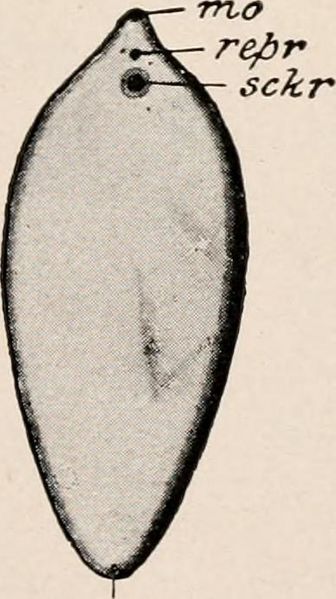Image: Image from page 174 of "Introduction to zoology; a guide to the study of animals, for the use of secondary schools;" (1900) (14598306110)

Description: Identifier: introductiontozo00dave Title: Introduction to zoology; a guide to the study of animals, for the use of secondary schools; Year: 1900 (1900s) Authors: Davenport, Charles Benedict, 1866-1944 Davenport, Gertrude Anna Crotty, 1866- Subjects: Zoology Publisher: New York, Macmillan company London, Macmillian and co., ltd. Contributing Library: MBLWHOI Library Digitizing Sponsor: MBLWHOI Library View Book Page: Book Viewer About This Book: Catalog Entry View All Images: All Images From Book Click here to view book online to see this illustration in context in a browseable online version of this book. Text Appearing Before Image: produces liver-flukes.3 Theyoung liver-flukes wriggle out of the snail, attach them-selves to damp grass, lose their tails, and encyst them-selves. If these cysts be eaten by asheep, they develop in the sheepsbody into an adult liver-fluke (Fig.145). Thus the stages which we canrecognize in the liver-fluke are : - First generation : egg from liver-fluke, larva, and adult sporocyst.Second generation : redia (this may be several times repeated).Third generation : cercaria larva, encysted larva, and adult liver-fluke. 1 Fig. 140, B. 2 Fig. 140, C. 3 These, while young, have tails, and are called cercaria. Text Appearing After Image: ever FIG. 145. - Distomum,the liver-fluke. Nat.size. Excr., excretorypore; mo., mouth; rep?.,reproductive aperture ;-srA1/*., posterior sucker.From Parker and Has-well. 156 ZOOLOGY Another flat worm is such an abject parasite that it haslost most of the organs usually possessed by worms. This isthe tapeworm (Fig. 147). When the eggs of the tape-worm are taken into the body of an herbivorous animal, theembryos develop there for a way and then stop. Whenflesh containing these embryos is eaten by a carnivorous eye. Note About Images Please note that these images are extracted from scanned page images that may have been digitally enhanced for readability - coloration and appearance of these illustrations may not perfectly resemble the original work.
Title: Image from page 174 of "Introduction to zoology; a guide to the study of animals, for the use of secondary schools;" (1900) (14598306110)
Credit: Image from page 174 of "Introduction to zoology; a guide to the study of animals, for the use of secondary schools;" (1900)
Author: Internet Archive Book Images
Permission: Internet Archive Book Images @ Flickr Commons
Usage Terms: No known copyright restrictions
License: No restrictions
License Link: https://www.flickr.com/commons/usage/
Attribution Required?: No
Image usage
The following page links to this image:

